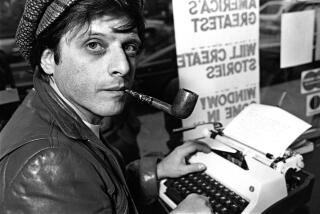Ralph Ellison, ‘Invisible Man’ Author, Dies
- Share via
Ralph Ellison, whose only novel, “Invisible Man,” became not only a dramatic cry for racial understanding but a work cherished over four decades for its complex yet poignant literary style, died Saturday.
He was 80.
Ellison, whose essays and novel propelled him into the front ranks of 20th-Century American fiction, died of pancreatic cancer at his home in Harlem, said Joe Fox, his editor at Random House, Ellison’s publisher.
Fox said Ellison had been ill for only a short time. Random House had a party for him on March 1 to celebrate his 80th birthday and “he was perfectly fine,” Fox said.
When “Invisible Man” was published in 1952, its author was a virtually unknown history and music student whose influences ranged from Langston Hughes to Mark Twain.
After 16 weeks on the bestseller lists and a National Book Award, Ralph Waldo Ellison (he was named after the philosopher-essayist) had become a household name among readers, regardless of color. His lone published novel--he had worked on a second but most of the manuscript perished in a fire--has not been out of print since.
Critics, scholars and readers see it as a convoluted study of a young black man who is struggling to affirm and make meaningful his race. He makes war on the twin standards of segregation that had forced him out of the mainstream and made him feel that he was less than a man.
Ellison himself was not only a sensitive youth in some conflict with his color, but an English scholar fascinated with the literature of his time.
His contention that American blacks were invisible because they were seen only as stereotypes, was couched in the classic, stylistic tumult of T.S. Eliot and the psychological myth of James Joyce.
Ellison found the impetus and strength to respond to the stereotype in the popular music of his day, saying years later that blues singer Jimmy Rushing “represented, gave voice to, something which was very affirming of Negro life, feelings which you couldn’t really put into words.”
But it was a Fats Waller lyric that he credited with driving him to focus the painful introspection of autobiography that was evidenced in “Invisible Man.”
“What did I do,” asked the plaintive refrain, “to be so black and blue?”
The first lines of “Invisible Man” have become among the best known in American literature:
“I am an invisible man. No, I am not a spook like those who haunted Edgar Allan Poe; nor am I one of your Hollywood-movie ectoplasms. I am a man of substance, of flesh and bone, fiber and liquids--and I might even be said to possess a mind. I am invisible, understand, simply because people refuse to see me.”
The book tells of a young man from the South who journeys to Harlem.
The nameless narrator finds a symbol of oppression there that Ellison dubbed the “Monopolated Light and Power Company.” The central character moves from sight to blindness, from shadow to sun, as he battles the monolith in a plot difficult to summarize because of its personal and literary allusions.
The Negro (Ellison generally preferred that word to black) protagonist even incurs the enmity of his own people while managing to somehow drain power (control) from his arch-foe.
The mysterious journey takes place above ground except for Prologue and Epilogue, which occur in the narrator’s Underground Chamber near Harlem.
“Who knows,” the narrator wonders at the end, “but that on the lower frequencies, I speak for you?”
“Invisible Man” has been called a near-perfect example of the German Bildungsroman or a psychological and educational work that both informs and entertains.
“Invisible Man” has been translated into Czech, Danish, Dutch, Finnish, French, German, Hebrew, Swedish and Japanese.
Ellison later published two collections of essays and was working on restoring his second novel at the time of his death.
Unlike his narrator, Ellison was not a true son of the South. He was born in Oklahoma City to a construction worker father who died when he was 3 and raised by his mother who did domestic work to support them. But he said he still found in that frontier land vestiges of racial prejudice despite the more fluid relationships between whites and blacks.
In interviews with such newspapers as the Chicago Tribune, he loved to talk of how the city had set up a separate library for blacks but a black minister continued to insist on using the main, segregated branch.
City officials became disgusted and threw great piles of books into an abandoned pool hall. As a result, young Ellison found himself with free access to the world’s greatest minds.
He spent three years studying classical composition at Alabama’s Tuskegee Institute and then headed to New York, where, like his protagonist in the novel, he became a writer. He came under the guidance of Richard Wright, the most prominent black writer of the time. Wright introduced him to “Native Son,” Wright’s early, definitive work of the black experience, while poet Hughes introduced Ellison to Andre Malraux, the French essayist and Marxist.
Ellison said he took the best from both while also falling under the influence of Dostoevsky, Conrad, Eliot and Joyce.
Wright was the first to publish Ellison’s writings in a magazine he was then editing.
During World War II, Ellison served in the Merchant Marine and returned ready to write a novel about a black American soldier captured by the Germans.
What happened instead, he said, was that he was obsessed with his existence that he saw only as “invisible.” The book that came from that dark thought took seven years to write.
Ellison did not live long enough to completely reconstruct his second novel, which he said featured the childhood reminiscences of Cleothus, at 300 pounds the biggest kid in the first grade. He did publish the two collections of essays, “Shadow and Act” in 1964 and “Going to the Territory” in 1986.
Ellison taught and lectured at Yale, Rutgers, New York University, the University of Chicago and Bard College in New York.
His awards included the nation’s highest civilian honor--the Medal of Freedom--and membership in its most prestigious literary organization, the American Academy Institute of Arts and Letters.
In his late years Ellison said he had sought to create works of literary merit built on scaffolds of social causes.
What he perceived as current pessimism among blacks concerned him.
“I don’t think the country can afford (it),” Ellison said. “By some strange quirk of American fate it is the Afro-American who has sustained the nation’s optimism. If we can be optimistic down at the bottom of the social pyramid, then everyone else can afford to look and say, ‘If they still believe, what the hell are we complaining about.’ ”
Ellison is survived by his wife, Fanny, and a brother.
Ellison’s Writings
Excerpts from the writings of Ralph Ellison:
* “I am an invisible man. No, I am not a spook like those who haunted Edgar Allan Poe; nor am I one of your Hollywood-movie ectoplasms. I am a man of substance, of flesh and bone, fiber and liquids -- and I might even be said to possess a mind. I am invisible, understand, simply because people refuse to see me. Like the bodiless heads you see sometimes in circus sideshows, it is as though I have been surrounded by mirrors of hard, distorting glass. When they approach me they see only my surroundings, themselves, or figments of their imagination--indeed, everything and anything except me.”
--Opening of “Invisible Man.”
* “In the beginning was not the shadow, but the act, and the province of Hollywood is not action, but illusion. Actually, the anti-Negro images of the films were (and are) acceptable because of the existence throughout the United States of an audience obsessed with an inner psychological need to view Negroes as less than men. Thus, psychologically and ethically, these negative images constitute justifications for all those acts, legal, emotional, economic and political, which we label Jim Crow. The anti-Negro image is thus a ritual object of which Hollywood is not the creator, but the manipulator. Its role has been that of justifying the widely held myth of Negro unhumanness and inferiority by offering entertaining rituals through which that myth could be reaffirmed.”
--From the essay “The Shadow and the Act,” Dec. 6, 1949.
* “In the old days the voice was high and clear and poignantly lyrical. Steel-bright in its upper range and, at its best, silky smooth, it was possessed of a purity somehow impervious to both the stress of singing above a twelve-piece band and the urgency of (Jimmy) Rushing’s own blazing fervor. On dance nights, when you stood on the rise of the school grounds two blocks to the east, you could hear it jetting from the dance hall like a blue flame in the dark; now soaring high above the trumpets and trombones, now skimming the froth of reeds and rhythm as it called some woman’s anguished name--or demanded in a high, thin, passionately lyrical line, ‘Baaaaay-bay, Bay-aaaay-bay! Tell me what’s the matter now!’--above the shouting of the swinging band.”
--From the essay “Remembering Jimmy,” July 12, 1958.
Source: Associated Press
More to Read
Sign up for our Book Club newsletter
Get the latest news, events and more from the Los Angeles Times Book Club, and help us get L.A. reading and talking.
You may occasionally receive promotional content from the Los Angeles Times.










